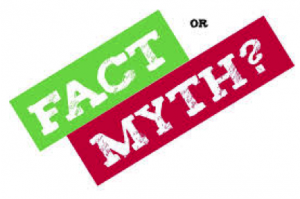 In their outstanding book ”Discover Your Sales Strengths,” Benson Smith & Tony Rutigliano of the Gallup Organization explain that “much of what has been written and taught about sales excellence has little to do with what really matters. All too many managers, authors, and so-called sales gurus are dead wrong about what it takes to be a great sales performer.” In research conducted by the Gallup Organization, they identified several myths about what it takes to succeed in sales. Here are the first four:
In their outstanding book ”Discover Your Sales Strengths,” Benson Smith & Tony Rutigliano of the Gallup Organization explain that “much of what has been written and taught about sales excellence has little to do with what really matters. All too many managers, authors, and so-called sales gurus are dead wrong about what it takes to be a great sales performer.” In research conducted by the Gallup Organization, they identified several myths about what it takes to succeed in sales. Here are the first four:
The Education Myth – A higher degree and better grades equate to better sales performance.
Fact: Gallup found that most of the salespeople in the top quartile did not have advanced degrees. In fact, most of the best performers had not achieved high grade point averages in college. In all the companies Gallup has studied, they have never – even in very technical fields – found a relationship between education and sales success.
The Experience Myth – Better salespeople typically have more experience.
Fact: Sales is not an experience-sensitive profession. The learning curve in most sales jobs is short. Gallup rarely found a strong correlation between experience and results.
The “A-Good-Salesperson-Can-Sell-Anything” Myth – Selling is selling; In other words, a good salesperson can sell anything.
Fact: From time to time the researchers at Gallup found salespeople who had done a good job in several different sales capacities. However, such all-around naturals were rare. Instead, they repeatedly found that salespeople who did the best in any company shared a configuration of skills and strengths that were well matched to their roles. Thus, a salesperson might do an exceptional job in one situation and a mediocre job in another.
The Relationship Myth – Relationships are critical to selling.
Fact: The notion that relationships are critical to selling is so widely held that everyone assumes it must be true. And in part it is. People with strong people skills frequently use those strengths to generate positive results. But we also see people with great relationship abilities who are not able to sell a thing. Why? Because relationship-building skills alone are not enough.
The best salespeople are able to get customers to make commitments. They are not afraid to risk the relationship to challenge a prospect’s perspective, confront a customer or ask for the business. Surprisingly, Gallup has found a good number of top salespeople who have only average people skills, but they do have the ability to influence others.
Salespeople that avoid relationship selling actually build better business partnerships with their customers. Their customers remain loyal because there is a good business reason. The business they do with their customers is not based on whether they like someone or not. That means that the salespeople have better control over their future orders. They find it easier to achieve the targets that they have set.
This insight was recently corroborated by the research conducted by the Corporate Executive Board (“CEB”) and discussed in their book titled “The Challenger Sale.” The CEB found that of all the different types of salespeople they studied, the relationship builders had the lowest overall results. When it came to selling commodities, only 11% of the top performing salespeople were relationship builders. When the sale was more complex and a consultative sales approach was preferred, only 4% of the top performers were relationship builders.
One of the biggest reasons for this disparity is that salespeople with strong people skills are often plagued with hidden weaknesses that impede their ability to sell. The big five are: (1) High Need for Approval, (2) Non-Supportive Buy Cycle, (3) Money Issues, (4) Tendency to get Emotionally Involved, and (5) Self-Limiting Beliefs. These weaknesses are typically invisible to most sales managers.
Salespeople that continue to rely on relationship selling will find that they get poorer results in return for the effort they expend. Their prospects will be delighted at all the help, friendship and free consultancy that they get from these salespeople, but they will often go elsewhere to place orders. Relationship sellers will always struggle to control their sales pipeline and they will find it hard to meet their sales objectives.

